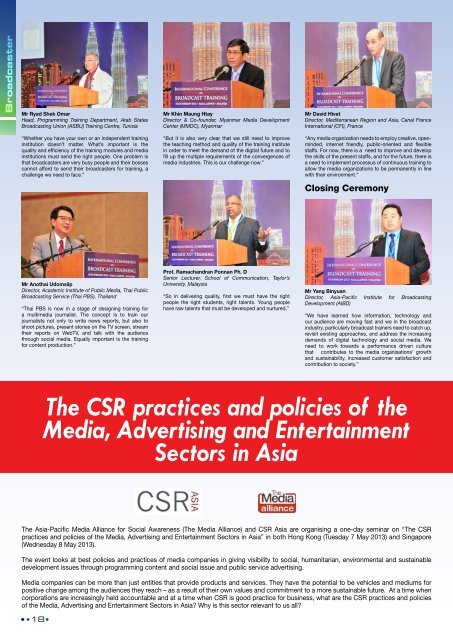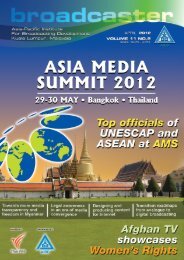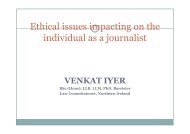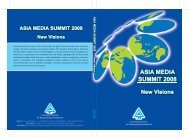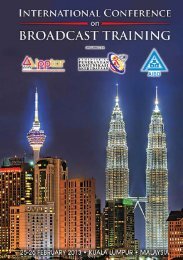Co-productions
Broadcaster 042013.pdf - AIBD
Broadcaster 042013.pdf - AIBD
- No tags were found...
Create successful ePaper yourself
Turn your PDF publications into a flip-book with our unique Google optimized e-Paper software.
Broadcaster<br />
Mr Ryad Shek Omar<br />
Head, Programming Training Department, Arab States<br />
Broadcasting Union (ASBU) Training Centre, Tunisia<br />
Mr Khin Maung Htay<br />
Director & <strong>Co</strong>-founder, Myanmar Media Development<br />
Center (MMDC), Myanmar<br />
Mr David Hivet<br />
Director, Mediterranean Region and Asia, Canal France<br />
International (CFI), France<br />
“Whether you have your own or an independent training<br />
institution doesn’t matter. What’s important is the<br />
quality and efficiency of the training modules and media<br />
institutions must send the right people. One problem is<br />
that broadcasters are very busy people and their bosses<br />
cannot afford to send their broadcasters for training, a<br />
challenge we need to face.”<br />
“But it is also very clear that we still need to improve<br />
the teaching method and quality of the training institute<br />
in order to meet the demand of the digital future and to<br />
fill up the multiple requirements of the convergences of<br />
media industries. This is our challenge now.”<br />
“Any media organization needs to employ creative, openminded,<br />
internet friendly, public-oriented and flexible<br />
staffs. For now, there is a need to improve and develop<br />
the skills of the present staffs, and for the future, there is<br />
a need to implement processus of continuous training to<br />
allow the media organizations to be permanently in line<br />
with their environment.”<br />
Closing Ceremony<br />
Mr Anothai Udomsilp<br />
Director, Academic Institute of Public Media, Thai Public<br />
Broadcasting Service (Thai PBS), Thailand<br />
“Thai PBS is now in a stage of designing training for<br />
a multimedia journalist. The concept is to train our<br />
journalists not only to write news reports, but also to<br />
shoot pictures, present stories on the TV screen, stream<br />
their reports on WebTV, and talk with the audience<br />
through social media. Equally important is the training<br />
for content production.”<br />
Prof. Ramachandran Ponnan Ph. D<br />
Senior Lecturer, School of <strong>Co</strong>mmunication, Taylor’s<br />
University, Malaysia<br />
“So in delivering quality, first we must have the right<br />
people the right students, right talents. Young people<br />
have raw talents that must be developed and nurtured.”<br />
Mr Yang Binyuan<br />
Director, Asia-Pacific Institute for Broadcasting<br />
Development (AIBD)<br />
“We have learned how information, technology and<br />
our audience are moving fast and we in the broadcast<br />
industry, particularly broadcast trainers need to catch up,<br />
revisit existing approaches, and address the increasing<br />
demands of digital technology and social media. We<br />
need to work towards a performance driven culture<br />
that contributes to the media organisations’ growth<br />
and sustainability, increased customer satisfaction and<br />
contribution to society.”<br />
The CSR practices and policies of the<br />
Media, Advertising and Entertainment<br />
Sectors in Asia<br />
The Asia-Pacific Media Alliance for Social Awareness (The Media Alliance) and CSR Asia are organising a one-day seminar on “The CSR<br />
practices and policies of the Media, Advertising and Entertainment Sectors in Asia” in both Hong Kong (Tuesday 7 May 2013) and Singapore<br />
(Wednesday 8 May 2013).<br />
The event looks at best policies and practices of media companies in giving visibility to social, humanitarian, environmental and sustainable<br />
development issues through programming content and social issue and public service advertising.<br />
Media companies can be more than just entities that provide products and services. They have the potential to be vehicles and mediums for<br />
positive change among the audiences they reach – as a result of their own values and commitment to a more sustainable future. At a time when<br />
corporations are increasingly held accountable and at a time when CSR is good practice for business, what are the CSR practices and policies<br />
of the Media, Advertising and Entertainment Sectors in Asia? Why is this sector relevant to us all?<br />
18


